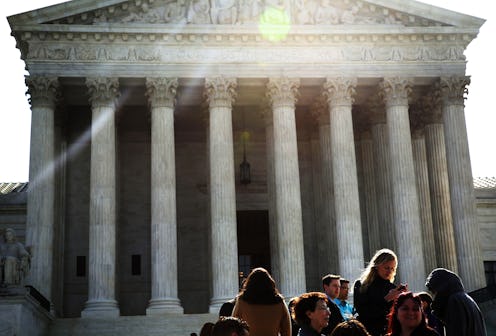News
SCOTUS Rules In Favor Of "Religious Freedoms"
In yet another demonstration of "religious freedoms" standing up in court, the Supreme Court sided Monday with public prayers held in town council meetings in Greece, New York. Along their traditional 5-4 ideological split, the justices ruled in favor of the town's right to hold sectarian prayers before meetings on public grounds, a rebuke to the plaintiffs who filed against the city — one a Jew, the other an atheist. Although the town had no official policy dictating which faith's prayers to use, every prayer was explicitly Christian until 2008, when a suit was filed by residents.
The crux of the decision was, as it so often is, Justice Anthony Kennedy — while a conservative justice by his voting record, but the only one ideologically malleable enough to occasionally side with the liberal minority. In assessing the legality of the public prayers, Kennedy made his leanings on the bill, which hinges on a "religious freedoms" ideal, quite clear. He insisted, beyond even just endorsing the practice of public worship at a civic event, that such prayers don't need to be non-sectarian to avoid violating the establishment clause of the First Amendment. Rather, his view is that demanding non-sectarian prayers itself enforces a kind of religious censorship:
To hold that invocations must be nonsectarian would force the legislatures that sponsor prayers and the courts that are asked to decide these cases to act as supervisors and censors of religious speech.
This is, put simply, a big ruling for how local municipalities and towns handle the practice of public faith. This new precedent will no doubt be tested in other town halls across America, as driven as many on the religious right have lately been to combat the rise of secular values through litigation, hinged on their freedom of faith.
And it's perhaps a foreshadowing of another big ruling the court still has in the pipeline, after hearing arguments in March on whether the Hobby Lobby company can refuse contraceptive coverage in female employees' insurance plans, on grounds of religious conscience. A case similarly driven by belief, of a New Mexico wedding photographer sued for refusing service to a lesbian couple, was declined by the court.
The upshot of this public prayer ruling, for those female employees who don't think their boss' religion should impact their health care, is frankly not good. Reporting at the time of the hearings already suggested the justice's demeanors suggested a conservative victory, which makes sense — even as an ostensible swing vote, Kennedy by-and-large sides with the Roberts/Alito/Scalia/Thomas wing of the court.
And now, seeing his demonstrated support for the imposition of faith on the faithless, defending the distinction between "offense" and "coercion" in supporting such public prayers, Kennedy seems to be wearing the same ideological trappings on religion as do his more conservative counterparts. And whether days or weeks from now, when the Hobby Lobby ruling drops, that could have dire consequences for a lot of women.
